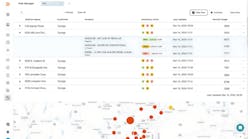MEMBERS of the House of Representatives Transportation and Infrastructure Committee approved a bill November 19 to ban wetlines (exposed retained product piping) on cargo tank trailers used to transport Class 3 flammable liquids. The bill (HR 4016) still must be approved by the full House and must be passed by the Senate.
Wetlines containing Class 3 flammables would not be allowed on new cargo tanks (DOT406 and possibly DOT407) constructed two years after the legislation becomes law. In addition, tank trailer owners would have to begin a wetlines retrofit in 2025. In the original bill, the wetlines retrofit was set to start in 2020. The first draft of the legislation would have banned wetlines on existing and all new tank trailers within one year of enactment.
“While NTTC (National Tank Truck Carriers Inc) continues to believe this legislation is not necessary, we are pleased that the retrofit has been put off another five years,” said John Conley, NTTC president. “This will reduce the operational, economic, and, most importantly, the negative safety impact on the tank truck industry that previous drafts would have caused.”
HR 4016 does not mandate any specific wetlines purging technology or product. It would give more flexibility to cargo tank manufacturers, component suppliers, tank truck operators to develop various methods or systems for compliance. The legislation also calls for a panel to study methods of safer welding on petroleum cargo tanks and prohibits roadside inspectors from opening cargo tank valves to check for compliance.
Amendment effort
During the committee debate, Rep Tom Petri (R-WI) sought a clear exemption in the bill for MC307 and DOT407 tank trailers, but his proposed amendment was rebuffed by Democrats on the committee. He was told that this is not an issue because the Transportation Secretary will have the authority to determine which cargo tanks would be covered in the wetlines regulation written by the Department of Transportation (DOT).
The part of the bill referred to by Democrats is entitled “Limitation on Applicability.” It states in section (2) Alternative means of compliance — Subsection (a) that the legislation “does not apply to a cargo tank motor vehicle that utilizes an alternative means to eliminate the safety hazard presented by the transportation of a Class 3 flammable material in the external product piping of such vehicle, if the Secretary (of Transportation) determines, following notice and an opportunity for public comment, that such an alternative means provides a level of safety at least equal to the level of safety that would be provided by a prohibition of the transportation of a Class 3 flammable liquid in the external piping of such vehicle.”
Clearly, there is no specific exclusion of MC307 or DOT407 cargo tank trailers from HR 4016, and there is no guarantee that the transportation secretary will exempt these tank trailers. These tank trailers are used to transport a wide range of Class 3 flammable liquids, including acetone, alcoholic beverages, amines, benzene, butyl nitrites, isocyantes, methanol, paints and coatings, pesticides, and vinyl acetate.
During the November 19 hearing, Transportation and Infrastructure Committee Chairman James Oberstar (D-MN) repeatedly criticized PHMSA and its officials for incompetence and for failing to write regulations (particularly wetlines rules) requested by the National Transportation Safety Board (NTSB). Oberstar's attacks on PHMSA began in early 2009 and have been unrelenting. Senior officials at PHMSA have been dismissed from their positions and sent into exile at other agencies. Bulk Transporter detailed some of these actions in the October issue.
Field trip
Markup of HR 4016 came just days after members of the House Transportation and Infrastructure Subcommittee on Railroads, Pipelines, and Hazardous Materials took a November 16 field trip that included a tour of a Baltimore, Maryland cargo tank repair shop and a public hearing. This field trip gave NTTC, the American Trucking Associations, and their members a last chance to make their case that a wetlines ban was unnecessary and would do nothing to improve cargo tank safety.
Markup of HR 4016 originally was set for November 5 but was delayed two weeks to give members of the subcommittee more time to study the issue. Subcommittee Chairman Corrine Brown (D-FL) led the fact-finding mission and was joined by other members of the subcommittee, including Rep Bill Shuster (R-PA), ranking minority member on the subcommittee; Rep Elijah Cummins (D-MD); Rep Timothy J Walz (D-WI); and Rep Grace Napolitano (D-CA). The Congressional delegation also included Rep Donna Edwards (D-MD), a member of the full House Transportation and Infrastructure Committee; Rep Tom Petri (R-WI); and Rep Robert Latta (R-OH).
“We appreciate the opportunity to speak with these Congressmen and present our case,” said Dan Furth, NTTC vice-president. “We believe the shop visit and public hearing were productive. We got good questions from the members of the Congressional delegation, and members of the tank truck industry provided strong testimony to answer those questions.
“We are optimistic that the subcommittee understands the tank truck industry perspective and concerns. We are guardedly hopeful that the Congressmen will give the tank truck industry a reasonable amount of time to develop safe and practical approaches to resolve the wetlines issues. The key here is to avoid potentially dangerous requirements, specifically the ill-conceived retrofit requirement.”
Repair shop
The field trip started in the morning on November 16 at Baltimore Cargo Tank Services, where company president Roy Clark and his staff gave a tour of the shop and discussed cargo tank repair issues. In the afternoon, Rep Brown chaired a lively public hearing. Barbara Windsor, Hahn Transportation president, and John Cannon, Brenner Tank LLC vice-president of sales & marketing, testified on behalf of the tank truck industry. R J Molder, vice-president of fleet services at Kenan Advantage Group (KAG), offered additional comments during the public forum that followed the panel testimony.
Requiring tank trucks to purge excess product from external product piping — wetlines — will not improve the transport of flammable liquids and is dangerous to technicians that would have to retrofit the purging technology, Windsor told the Congressmen. “We believe the industry's safety record demonstrates that a mandate for wetlines-purging equipment is simply not justified,” she said. “Government statistics indicate that the risk of a fatal wetlines incident is approximately 1 in 30,000,000…In fact, the odds of being struck by lightning during your lifetime are 6,000 times greater than the odds of being killed in a wetlines incident.”
Cannon urged the subcommittee to limit any wetlines ban to just DOT406 cargo tanks, and he called for flexibility in the legislation that would allow alternate approaches to mitigate the risk of a wetlines incident. “By allowing alternative approaches, owners of tank trailers would be able to choose the manner of compliance that best works for their fleet,” he said. “We will need at least a year to develop alternate approaches once regulatory guidelines are published, and it will take at least one more year to bring the alternate approaches to market.”
Molder talked about the financial impact that a wetlines ban would have on a tank truck carrier like KAG, which buys approximately 100 new tank trailers each year. “We have been told that a wetlines purging system would add approximately $5,000 to the cost of a new trailer and would increase our capital expenses by $500,000 per year,” he said. “KAG may be forced to purchase fewer new trailers and will have to run its older trailers for a longer period of time. We estimate that a retrofit requirement would cost KAG over $13.8 million.
“KAG also has concerns over the impact of a wetlines purging system on our operating expenses. We have been told that a wetlines purging system takes approximately 10 minutes to purge the tank truck external pipes. Downtime from waiting for the system to purge would amount to a significant cost. We estimate that operation of a wetlines purging system would add 355,000 hours of driver downtime to our operating costs. That translates to a $7.6 million increase in our labor expenses. We're also concerned about costs associated with purging system failure. A purging system malfunction would require KAG to park the tank truck and transfer the contents to another truck. The cost associated with a malfunction could be approximately $1,000 per incident.”
Oberstar's claims
In a press release issued November 13, Oberstar repeated a discredited claim that tank truck wetlines were damaged or ruptured in more than 180 incidents over the past 10 years and that PHMSA had failed to address NTSB calls for a wetlines ban.
“The NTSB issued this recommendation (for a wetlines ban) more than a decade ago, but no one has addressed it,” Oberstar said. “The (compliance) expense to the trucking industry would be low — at most a few thousand dollars per truck — compared to the danger posed by wetlines, and the required change would be spread out over 10 years.”
In fact, the Department of Transportation (DOT) did address the issue both times it was raised by NTSB. In both cases, most recently in 2006, DOT concluded that no regulatory action was needed.
NTTC officials continue to dispute the wetlines incident statistics and the compliance costs tossed about by Oberstar and have vowed to keep fighting the legislation in the full House and the Senate.
“We can't give up on this,” Conley said. “We encourage members of the tank truck industry to continue to contact their Congressional representatives to support the amendments offered by NTTC and the American Trucking Associations.”








